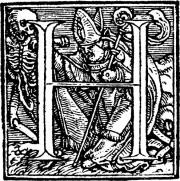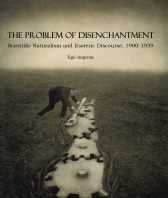Last autumn I completed my PhD dissertation, and now it’s time to defend it. The defence is public, and will take place on February 5, 2013, at 12:00 in the Agnietenkapel of the University of Amsterdam. The event is open to anyone (with a max. capacity of 90 people), and I will give a short public lecture on the topic of my research prior to defending it in front of the committee.
While I have given hints about my research in a number of posts here at Heterodoxology, I am now happy to present an official abstract of the final product – the dissertation itself:
The Problem of Disenchantment: Scientific Naturalism and Esoteric Discourse, 1900-1939
This dissertation presents a novel thesis on Max Weber’s notion of the “disenchantment of the world”. According to Weber, the disenchantment process was driven primarily by the modern natural sciences, leading to the disappearance of “magic” and the absolute separation of the spheres of science and religion. Combining history of science with the history of religion and esotericism, this work demonstrates that the modern natural sciences, pace Weber and his interpreters, cannot easily be described as having led to a disenchantment of the world. Instead, we find a number of significant overlaps between science, theology, and broadly “esoteric” outlooks, particularly in the form of “new natural theologies” and in philosophical positions defined as “open-ended naturalism”. These overlaps, moreover, signify areas where individual scientists and scientific institutions (journals, lecture platforms, scholarly societies) have suggested implications of their own work that go against the technical understanding of “disenchantment” – viz., countering strict mechanism, materialism, and/or reductionism, in favour of “re-enchanted” scientific worldviews, advocating the continuity between scientific research and the value spheres of religion, metaphysics, and ethics. While such reenchantment projects are well-known from “alternative” and “New Age” circles in the post-war era, a significant find of this work is that they were predated and prefigured in the intellectual production of influential pre-war scientists, scholars, and philosophers.
While this challenges the notion that modern science has been a straight-forwardly disenchanting agent, that is not to say that we are forced to accept the opposite view, often argued by post-war spiritual activists and some postmodern scholars, that the radical scientific changes of the early 20th century “naturally” suggests a form of “reenchanted science”. Avoiding such simplifications, this book instead proposes a new model of disenchantment that is able to account for the ultimately ambiguous role of science in the production of worldviews and identities. This model implies a change in focus, which can be summed up as a shift from process to problem: disenchantment should not be seen as a trans-historical “process”, but as a historically situated intellectual problem, to which individual actors – within and outside of academia – have found different responses.
Adopting and developing this model permits the writing of a historical narrative of the cultural entanglements of the pre-war sciences that brings surprising complexities to the fore. The book thus analyses responses to “the problem of disenchantment” in the established and emerging sciences of the early 20th century (physics, chemistry, biology, and psychology), the prospective science of parapsychology, and in prominent Western esoteric discourses (to wit, Theosophy, Anthroposophy and Crowleyan ritual magic). The work is concluded by a discussion of the broader implications of adopting a methodological stance of Problemgeschichte for the writing of intellectual history.
Show up on February 5th and see how it goes.
![]()
This blog post by Egil Asprem was first published on Heterodoxology. It is licensed under a Creative Commons Attribution-ShareAlike 3.0 Unported License.







Congrats, Egil! Go get ’em!
Thanks, Sarah!
I wish that I could be present for the defense, but I shall look for the book. Congratulations on your achievement, and keep moving forward!
Thanks, Chas!
Congratulations!
Any chance we get here glimpse at your future, hopefully academic, plans? (in terms of topics)
And what about heterodoxology? Will you now promote to busy and erratic post-doc who manages to compile at most 5 blog posts per year? 🙂
Time shall tell! Thanks for your enthusiasm anyway 🙂
Futures will be announced in due time, but not prematurely.
This sounds great, I wish I could attend! Early soviet scientific research (Bogdanov/Lunacharsky) has long seemed to me to prefigure the Frankfurt School’s wrestling with re-enchantment, I am looking forward to reading your work!
Egil, I too earnestly congratulate;
My apologies if this question of mine is irrelevant to The Problem of Disenchantment: Scientific Naturalism and Esoteric Discourse, 1900-1939, but just the other day I was going to go to the library to see if I could look at – and perhaps email to myself – (amongst a few other things): Interpreting “Mind-Cure”: William James and the “Chief Task…of the Science of Human Nature” EMMA KATE SUTTON 25 APR 2012 © Journal of the History of the Behavioral Sciences Volume 48, Issue 2, pages 115–133, Spring 2012
I’ve a fairly strong interest in the article, but because I’m obviously non-expert, it’s hard to tell if there’s a significant chance of any substantial intersection(s) between the ideas of SUTTON presented there and conceptions in your Problem of Disenchantment. Just curious is all…no way of knowing in advance if you’re familiar w/ Interpreting “Mind-Cure” – and if not, no sweat. … Either way, it’s good to see that the wheels are turning … presumably the defense came off w/o a hitch? All My Best,
Paul
Egil, pursuing this, on my hard drive found the (freely available on the web) May, 2012 article which is probably more relevant: “Psychical research and the origins of American psychology: Hugo Münsterberg, William James and Eusapia Palladino,” Andreas Sommer, University College London, UK; History of the Human Sciences 25(2) 23–44 2012. Still, this seems to belong (if at all) at heterodoxology.com below “Blind Spots of Disenchantment (2/3),” which is where I’ll submit it ’till it’s determined if it adds anything – since it antedates by at least a decade what’s posted there. From the abstract: “This article discusses strategies employed by psychologists in the United States to expel psychical research from the agenda of scientific psychology. It is argued that the traditional historiography of psychical research, dominated by accounts deeply averse to its very subject matter, has been part of an ongoing form of ‘boundary-work’ to bolster the scientific status of psychology.”